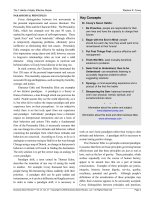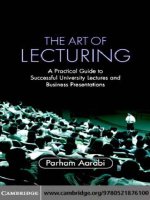Stephen r covey the 7 habits of highly effectiv kho tài liệu bách khoa
Bạn đang xem bản rút gọn của tài liệu. Xem và tải ngay bản đầy đủ của tài liệu tại đây (4.12 MB, 1,240 trang )
Copyright
The 7 Habits of Highly Effective
People
Copyright © 1989, 2004 by Stephen R.
Covey
Cover art to the electronic edition
copyright © 2012 by RosettaBooks,
LLC
All rights reserved. No part of this
book may be used or reproduced in any
form or by any electronic or
mechanical means, including
information storage and retrieval
systems, without permission in writing
from the publisher, except by a
reviewer who may quote brief passages
in a review.
Electronic edition published 2012 by
RosettaBooks LLC, New York.
ePub ISBN: 978-0-7953-2342-3
To my colleagues,
empowered
and empowering
Acknowledgments
Interdependence is a higher value than
independence.
This work is a synergistic product of
many minds. It began in the middle
seventies as I was reviewing 200 years
of success literature as part of a
doctoral program. I am grateful for the
inspiration and wisdom of many
thinkers and for the trans-generational
sources and roots of this wisdom.
I am also grateful for many students,
friends, and colleagues at Brigham
Young University and the Covey
Leadership Center and for thousands of
adults, parents, youth, executives,
teachers, and other clients who have
tested this material and have given
feedback and encouragement. The
material and arrangement has slowly
evolved and has imbued those who
have been sincerely and deeply
immersed in it with the conviction that
the Seven Habits represent a holistic,
integrated approach to personal and
interpersonal effectiveness, and that,
more than in the individual habits
themselves, the real key lies in the
relationship among them and in how
they are sequenced.
For the development and production of
the book itself I feel a deep sense of
gratitude:
—to Sandra and to each of our children
and their spouses for living lives of
integrity and service and for supporting
my many travels and involvements
outside the home. It’s easy to teach
principles loved ones live.
—to my brother John for his constant
love, interest, insights and purity of
soul.
—to the happy memory of my father.
—to my mother for her devotion to her
more than 87 living descendants and
for her constant demonstrations of
love.
—to my dear friends and colleagues in
the business, especially:
—to Bill Marre, Ron McMillan, and
Lex
Watterson
for
feedback,
encouragement, editorial suggestions,
and production help.
—to Brad Anderson, who at great
personal sacrifice for over a year,
developed a Seven Habits video-based
development program. Under his
leadership this material has been tested
and refined and is being implemented
by thousands of people across a broad
range of organizations. Almost without
exception, after initial exposure to this
material, our clients desire to make it
available to greater numbers of
employees,
underscoring
our
confidence that it “works.”
—to Bob Thele for helping to create a
system for our firm that gave me the
peace of mind to enable me to really
focus on the book.
—to David Conley for communicating
the value and power of the Seven
Habits to hundreds of business
organizations so that my colleagues,
Blaine Lee, Roice Krueger, Roger
Merrill and Al Switzler, and I have the
constant opportunity to share ideas in a
large variety of settings.
—to my proactive literary agent Jan
Miller, and my “can do” associate Greg
Link and his assistant Stephanni Smith
and Raleen Beckham Wahlin for their
creative and courageous marketing
leadership.
—to my Simon and Schuster editor
Bob Asahina for his professional
competence and project leadership, for
his many excellent suggestions and for
helping me to better understand the
difference between writing and
speaking.
—to my earlier devoted assistants
Shirley and Heather Smith and to my
present assistant Marilyn Andrews for
a level of loyalty which is truly
uncommon.
—to
our
Executive
Excellence
magazine editor Ken Shelton for his
editing of the first manuscript years
ago, for helping refine and test the
material in several contexts, and for his
integrity and sense of quality.
—to Rebecca Merrill for her invaluable
editing and production assistance, for
her inner commitment to the material,
and for her skill, sensitivity, and
carefulness
in
fulfilling
that
commitment, and to her husband,
Roger, for his wise, synergistic help.
—and to Kay Swim and her son,
Gaylord, for their much appreciated
vision which contributed to our
organization’s rapid growth.
Contents
FOREWORD
PART ONE: PARADIGMS AND PRINCIPLES
Inside-Out
The Seven Habits—An Overview
PART TWO: PRIVATE VICTORY
HABIT 1 Be Proactive
Principles of Personal Vision
HABIT 2 Begin with the End in Mind
Principles of Personal Leadership
HABIT 3 Put First Things First
Principles of Personal Management
PART THREE: PUBLIC VICTORY
Paradigms of Interdependence
HABIT 4 Think Win/Win
Principles of Interpersonal Leadership
HABIT 5 Seek First to Understand, Then to Be
Understood
Principles of Empathetic Communication
HABIT 6 Synergize
Principles of Creative Cooperation
PART FOUR: RENEWAL
HABIT 7 Sharpen the Saw
Principles of Balanced Self-Renewal
Inside-Out Again
A Personal Note
AFTERWORD: Questions I am Often Asked
APPENDIX A: Possible Perceptions Flowing out
of Various Centers
APPENDIX B: A Quadrant II Day at the Office
PROBLEM/OPPORTUNITY INDEX
INDEX
Foreword
When I wrote this book in 1989, I had
no idea how the world would change
and that people would be able to read
The 7 Habits of Highly Effective
People in this amazing way on these
amazing devices.
Since then, this book has been called
“the most influential business book of
the century” (by The Wall Street
Journal). It stayed on The New York
Times best-seller list for five years. A
“must-read”
translated
into
38
languages, with 20 million copies in
print (and is arguably the most pirated
business book in the world). Google 7
Habits and you’ll get more than 12
million hits.
I’ve been humbled and gratified by
the worldwide audience this book has
reached. Presidents, prime ministers,
and kings read the book, but so do
college students, construction workers,
and kitchen help. I’ve heard from
literally thousands of people who say
things like this:
“I learned to focus on truly
important things, not just urgent
things.”
I listen—really listen—to other
people for the first time.”
“Since I started thinking win-win
in a job that was killing me, I’ve
found a new mission and purpose
in my professional life.”
How will The 7 Habits impact you?
My hope is that you will find new
hope, a greater sense of purpose, more
peace of mind, and far more rewarding
relationships in both your personal and
professional life.
Stephen R. Covey
December 2009
FranklinCovey Co.
PART ONE
PARADIGMS
and
PRINCIPLES
Inside-Out
There is no real excellence in all this
world
which can be separated from right
living.
David Starr Jordan
I
N MORE THAN 25 YEARS of working
with people in business, university,
and marriage and family settings, I
have come in contact with many
individuals who have achieved an
incredible degree of outward success,
but have found themselves struggling
with an inner hunger, a deep need for
personal congruency and effectiveness
and for healthy, growing relationships
with other people.
I suspect some of the problems they
have shared with me may be familiar to
you.
I’ve set and met my career goals and
I’m having tremendous professional
success. But it’s cost me my personal
and family life. I don’t know my wife
and children any more. I’m not even
sure I know myself and what’s really
important to me. I’ve had to ask myself
—is it worth it?
I’ve started a new diet—for the fifth
time this year. I know I’m overweight,
and I really want to change. I read all
the new information, I set goals, I get
myself all psyched up with a positive
mental attitude and tell myself I can do
it. But I don’t. After a few weeks, I
fizzle. I just can’t seem to keep a
promise I make to myself.
I’ve taken course after course on
effective management training. I expect
a lot out of my employees and I work
hard to be friendly toward them and to
treat them right. But I don’t feel any
loyalty from them. I think if I were
home sick for a day, they’d spend most
of their time gabbing at the water
fountain. Why can’t I train them to be
independent and responsible—or find
employees who can be?
My teenage son is rebellious and on
drugs. No matter what I try, he won’t
listen to me. What can I do?
There’s so much to do. And there’s
never enough time. I feel pressured and
hassled all day, every day, seven days a
week. I’ve attended time management
seminars and I’ve tried half a dozen
different planning systems. They’ve
helped some, but I still don’t feel I’m
living the happy, productive, peaceful
life I want to live.
I want to teach my children the value of
work. But to get them to do anything, I
have to supervise every move... and put
up with complaining every step of the
way. It’s so much easier to do it myself.
Why can’t children do their work
cheerfully
and
without
being
reminded?
I’m busy—really busy. But sometimes I
wonder if what I’m doing will make any
difference in the long run. I’d really
like to think there was meaning in my
life, that somehow things were different
because I was here.
I see my friends or relatives achieve
some degree of success or receive some
recognition, and I smile and
congratulate them enthusiastically. But
inside, I’m eating my heart out. Why do
I feel this way?
I have a forceful personality. I know, in
almost any interaction, I can control
the outcome. Most of the time, I can
even do it by influencing others to
come up with the solution I want. I
think through each situation and I
really feel the ideas I come up with are
usually the best for everyone. But I feel
uneasy. I always wonder what other
people really think of me and my ideas.
My marriage has gone flat. We don’t
fight or anything; we just don’t love
each other anymore. We’ve gone to
counseling; we’ve tried a number of
things, but we just can’t seem to
rekindle the feeling we used to have.
These are deep problems, painful
problems—problems that quick fix
approaches can’t solve.
A few years ago, my wife Sandra and
I were struggling with this kind of
concern. One of our sons was having a
very difficult time in school. He was
doing poorly academically; he didn’t
even know how to follow the
instructions on the tests, let alone do









